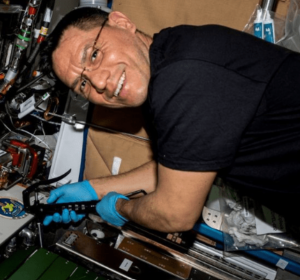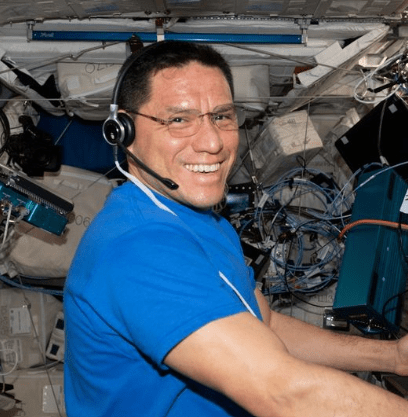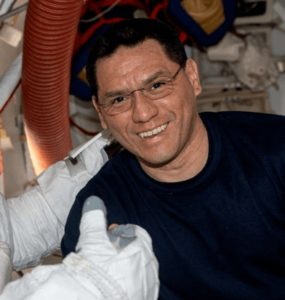Exploring the Cosmos: Frank Rubio’s Pioneering Mission Aboard the International Space Station
Frank Rubio, a distinguished NASA astronaut, has recently concluded an extraordinary 371-day expedition aboard the International Space Station (ISS).
This remarkable mission stands as a testament to human endurance and scientific exploration, shedding light on the effects of extended space travel on the human body.
Rubio’s achievement sets a new record for the longest time spent in space by a U.S. astronaut, unlocking invaluable insights crucial for future deep space expeditions, potentially even venturing to Mars.
Frank Rubio’s historic expedition on the International Space Station serves as a beacon of human ingenuity and determination. It not only pushes the boundaries of space exploration but also deepens our understanding of the cosmos and our place within it.
As we continue to forge ahead into the realm of unknowns, Rubio’s mission will stand as an inspiration, propelling us toward a future where the stars are within our grasp.
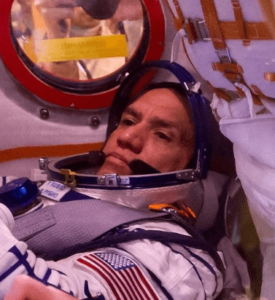
Also Read: Is Kylie Pentelow Leaving ITV News? Where is She Now?
Table of Contents
Frank Rubio: Who Is He?
A Voyage Beyond Earth’s Boundaries
In the realm of space exploration, Frank Rubio has etched his name in history with an unprecedented 371-day mission on the International Space Station.1
This extended sojourn in the cosmos allowed him to delve deep into scientific research, a venture vital for unraveling the mysteries of long-duration space travel and its impact on the human physique.
Pioneering Research and Discoveries
During his extensive stay aboard the ISS, Rubio engaged in pivotal research endeavors, advancing our comprehension of how prolonged exposure to a space environment affects human physiology.
These critical findings provide a significant leap forward in understanding the human body’s adaptive mechanisms and potential health implications when venturing beyond Earth’s atmosphere.
Rubio’s monumental mission has set a new benchmark for U.S. astronauts, showcasing the resilience of the human body and mind in the face of prolonged space travel.
As we look ahead to future deep space exploration, including prospective missions to Mars, the knowledge gleaned from Rubio’s journey is of paramount importance.
It forms the bedrock upon which we build strategies to ensure the well-being and performance of astronauts during extended missions, propelling us closer to realizing the dream of interplanetary travel.
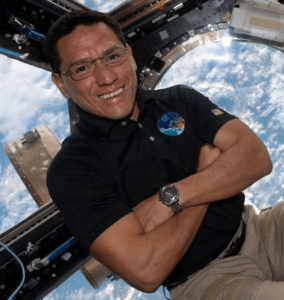
NASA Astronaut Frank Rubio Health in 2023
NASA astronaut Frank Rubio’s expedition into the vast expanse of space has granted us a profound insight into the potential impacts of extended space journeys on human health.
Thus far, he has managed to steer clear of any major health complications.
Muscles and Bones in the Abyss of Space
In the absence of Earth’s constant gravitational force, muscles and bones undergo significant transformations. Muscles, crucial for maintaining posture, especially in the back and legs, tend to atrophy due to reduced exertion.
Bone density experiences a rapid decline, amplifying the risk of fractures. To combat this, astronauts engage in hours of daily exercises and adjust their diets to counter these physiological alterations.
The Battle of the Bulge: Weight Management in Space
Adapting to the microgravity environment makes it challenging for astronauts to maintain a healthy weight, as their metabolisms undergo significant adjustments.
Even an astronaut’s eyesight can bear the brunt of the altered distribution of bodily fluids in a microgravity environment.
Cognitive performance is not immune to the effects of space travel. The brain grapples with adapting to the unprecedented conditions of weightlessness, causing fluctuations in cognitive functions.
Rewiring the Brain: Structural Changes
The structure of the brain itself can be altered in space, influencing motor function and orientation.
Space exploration has revealed that even DNA is not impervious to the cosmic realm. Rubio’s mission and others have shown changes in telomere length, possibly linked to radiation exposure.
The immune system is not spared from the transformative effects of space. White blood cell counts can decrease in response to the radiation doses received during the mission.
Frank Rubio’s Return: A Pioneering Tale
As Frank Rubio returns to Earth, his narrative becomes a pivotal chapter in unraveling the influence of space on human health.
The knowledge amassed from his expedition will deepen our comprehension of the cosmos, illuminating the path for future forays into the enigmas of the universe.
Rubio’s journey may have concluded, but the revelations regarding its impact on human health are just beginning to surface, propelling us towards a future amidst the stars.
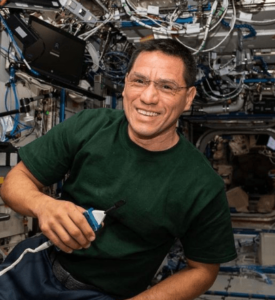
Also Read: Joe Cronin (11th Blazers GM) Bio, Age, Wiki, Career & Net worth 2023
Frank Rubio: Journey in Space
NASA astronaut Frank Rubio, after an unprecedented 371-day mission in space, has safely returned to Earth, marking a significant milestone in space exploration.2
The Remarkable Return
Rubio, alongside Russian cosmonauts Sergey Prokopyev and Dmitri Petelin, completed their unexpected expedition with a secure parachute-assisted landing in Kazakhstan at 7:17 a.m. EST.
This event set a new world record, surpassing the previous longest duration in microgravity by an American astronaut, previously held by NASA astronaut Mark Vande Hei at 355 days.
An Unexpected Mission Extension
The need for the extended mission arose due to a coolant leak detected on the Soyuz MS-22 spacecraft, the vessel they utilized for their journey to the International Space Station (ISS). This unforeseen circumstance added a layer of complexity to their venture.
Despite the unexpected extension, this extended mission turned out to be an unparalleled experience, encompassing an astonishing 157.4 million miles and 5,963 orbits around our home planet.
This mission has expanded our understanding of the challenges and triumphs associated with prolonged space expeditions.
Post-Landing Assessments and Future Plans
Following their landing, rigorous medical examinations were conducted to ensure the astronauts’ well-being. Rubio, a 47-year-old and a devoted father of four, had planned to return to Houston via a NASA airplane.
In hindsight, Rubio reflected on his new record, expressing that had he known the mission would be extended to this extent, he “probably would have declined.”
The primary reason cited was his strong family commitments, underscoring the importance of significant life events he would have missed.
Frank Rubio’s remarkable journey to space not only broke records but also shed light on the unforeseen challenges astronauts face during prolonged expeditions.
The dedication and sacrifice of individuals like Rubio contribute to the advancement of our understanding of the cosmos and pave the way for future space exploration.
